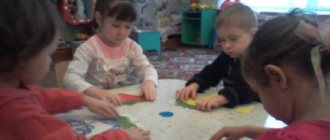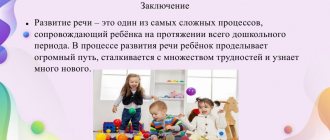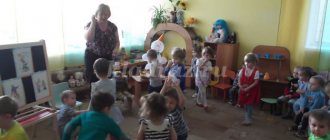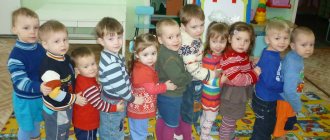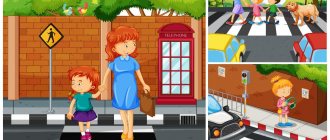Progress of the game
The teacher gives the children to look at balls of different colors (blue, green, red, yellow)
and different sizes
(large and small)
. Show them jumping and say rhythmically:
Jump and jump
Everybody jump and jump
Sleep our ball
Not used to it.
The teacher brings out two dolls - a large and a small one - and says: “The big doll Olya is looking for a ball for herself. Little doll Ira also wants to play with the ball.” Invites children to pick up balls for dolls. Children select balls of the required size (for a large doll - a large ball, for a small doll - a small ball)
.The doll Olya is capricious: she needs a yellow ball, the same as her skirt. The doll Ira is also angry: she needs a red ball like her bow. The teacher offers to calm the dolls down: pick the right balls for them.
Game "Decorate the butterfly"
Target:
— Teach children to group by color .
— To consolidate knowledge about the geometric figure of a circle, about the concept of many - one, large - small.
Progress of the game:
The teacher takes two balls of different sizes and throws one far, the other closer. She asks the children which ball she threw far and which one close. The second time she asks where she threw the big and where the small ball. children throw the ball , and the rest determine which ball was thrown far and which was thrown close.
Game "Guess where they hid"
Purpose of the game:
To train children in the ability to navigate in space.
OD summary on sensory development for children of the 1st junior group of preschool educational institutions
Summary of educational activities on sensory development in the 1st junior group on the topic “Colored cubes”
Author: Chernikova Dina Nikolaevna, teacher of MBDOU kindergarten No. 1 in the village of Staroe Melkovo, Tver region, Konakovsky district. Description of the material: I offer you a summary of educational activities for children of the 1st junior group (2-3 years old) on sensory development on the topic “Colored cubes.” This material will be useful to teachers of the younger group. This is a summary of an educational lesson aimed at selecting pairs of objects of the same color. Goal: select pairs of objects of the same color. Objectives: Educational:
- select pairs of objects of the same color;
— teach children to focus on dangerous objects encountered in life; give an idea that they can harm our body; - formation of a cautious and prudent attitude towards situations that are potentially dangerous for humans and the natural world around them. Developmental:
- develop children’s ability to compare colors according to the principle “this way - not that way.”
Educational:
- cultivate friendly relationships, attention to each other.
Vocabulary work: like this, not like that. Methodological techniques: surprise moment, examination of objects, conversation-dialogue, productive activity of children, analysis, summing up. Material: multi-colored cubes, letter, box.
OD progress:
I. Introductory part. 1. Surprise moment. Educator: Guys, look, there is some kind of box on the table. Who left her? (Children's answers). What's in the box? (Children's answers). Can we approach someone else’s box? (Children’s answers) Educator: That’s right, children, we can’t approach someone else’s box, as it can be a dangerous object. You can never pick up a thing if it is not yours! On the bus, train or subway, it’s better to tell an adult everything. There they will ask you about the find. And then nothing will happen for sure! Remember! To prevent trouble from happening, don’t pick up an unfamiliar object! (Knock on the door, the postman brought a letter). Educator: Children, we received a letter from Katya’s doll. Let's read it: “Dear guys, hello! I sent you a box of multi-colored cubes as a gift. Doll Katya" Teacher: Guys, this box was sent to us by the doll Katya. Now can we come up and open the box? (Children's answers). (The teacher opens the box with cubes. Children look at the cubes). II. Main part. (The teacher and children are on the carpet). 1.Introduction to the topic. (The teacher pours the cubes onto the carpet, takes one cube in his hand) Educator: This is the cube I chose. Let's find the same cube. You need to attach a cube taken from the pile to the selected cube. (Children add other cubes until the color of the cubes matches). Educator: Like this? No, not like that. And this one is not like that either. This one is like this. Identical cubes. 2. Physical exercise “Game of cubes”. (We perform movements according to the text). We take the cube in our right hand, we take the cube in our left hand, we place the cube beautifully on the cube. We will build a big house for the dolls and arrange a housewarming party for the dolls. 3. Independent work with handouts. Educator: And now I will give you cubes of different colors. Find them matches. (Children match pairs of cubes). Educator: Guys, did you like the multi-colored cubes from Katya’s doll? (Children’s answers). Now let's write her a letter in response and thank the Katya doll for her gift. (The children and the teacher write a letter to the doll Katya). III. Final part. Educator: Guys, let's remember how we got the box? (Children's answers). Let’s conclude: don’t touch someone else’s object, don’t take something you don’t know. (The lesson ends by putting the cubes in a box)
We recommend watching:
Notes for a lesson on sensory development in the 1st junior group. Notes for a lesson on speech development in the 1st junior group. group Notes of a complex lesson in junior group I Notes of educational activities in the early age group
Similar articles:
Summary of GCD in the 1st junior group by February 23
Progress of the game:
The teacher shows the children butterflies and says that they have come to visit them. He says that the butterflies brought mugs of different colors with them and want the children to decorate their wings. The teacher offers to help the butterflies. First, he asks each child to choose mugs of the same color from the four offered. At the same time, he invites one or the other child to choose mugs of the color he likes. After all the children have chosen, the teacher gives them silhouettes of butterflies and invites them to decorate them.
At the end of the game, the teacher praises all the children .
Game “Help the bear find his plate”
Goal: - To teach children to compare objects by size (large - small, compare them (small plate - small teddy bear, large - big bear)
.
Progress of the game
The teacher and the children look at the toys (small bear, big bear), then asks:
- What plate will we give to little Mishka? (small)
What kind of plate should we give to the big bear?
(large)
Game “Where did we throw the ball”
Purpose of the game:
— Reinforce the concept: “close”
,
"far"
.
— Teach children to compare objects by size (large and small balls)
Progress of the game:
The teacher brings two houses and tells the children that one house is for the fox and the other is for the hare. The animals are renovating their houses, bought furniture, and decided to lay new rugs on the floor. Invites children to help the animals choose rugs that look like mugs. The teacher shows the rugs: green and red. The fox immediately liked the red rugs, the hare green. Children must select the rugs and load them for the fox on the red car, and for the bunny on the green car.
Game option: invite children to select large and small rugs of the same color or different colors.
We use a variety of games and play exercises for size, for example, we offer 2 objects each, sharply different from each other in length, width, height:
show the short ribbon. The yellow ribbon is short, and the blue ribbon is long.
;
show the wide path, the blue path is wide and the red path is narrow
;
find two identical Christmas trees (out of three offered)
.
Game "Big and small balls"
Target:
teach to distinguish color and size (large - small)
;
select size balls for dolls;
choose the right balls by color and size.
